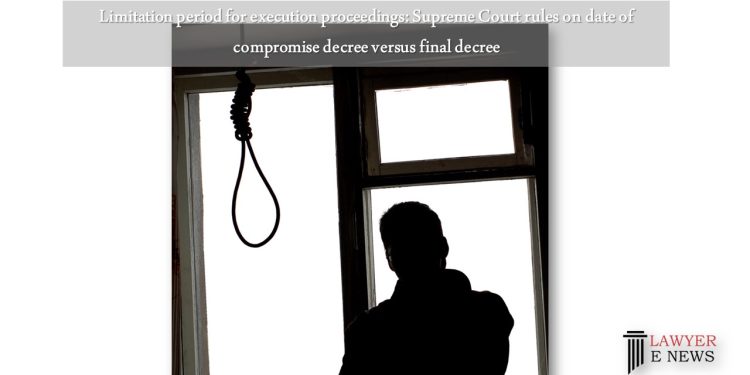Limitation period for execution proceedings: Supreme Court rules on date of compromise decree versus final decree

On 24 April 2023, Supreme Court of India has ruled on the interpretation of Article 136 of the Limitation Act, 1963, in a case involving the execution of a compromise decree. The case concerned the question of whether the date on which the compromise decree was entered into or the date when the final decree was passed would be considered for establishing the period of limitation under the Act for instituting execution proceedings. Supreme Court held that a decree becomes enforceable from its date or on some future date or on the happening of certain specified events. It also held that the cause of action to execute a compromise decree arises only when the dispossession of the decree holder is confirmed by the Civil Court.
In the case, the appellant had contended that the execution application was barred by time as it was filed after 12 years from the date of the decree. The court noted that Article 136 of the Act prescribes that the execution proceedings have to be initiated within 12 years from the date when the decree or order becomes enforceable. The court referred to previous judgments to interpret Article 136 and emphasized that a fair construction is to be given to the decree to prevent it from being rendered futile on technicalities.
The court held that a decree becomes enforceable from its date or on some future date or on the happening of certain specified events. It also held that the cause of action to execute a compromise decree arises only when the dispossession of the decree holder is confirmed by the Civil Court. In this case, the dispossession of the respondents was confirmed when the rights in favor of a third person were finally determined by the Civil Court. The court held that the limitation period would commence only with the decree becoming enforceable and capable of being executed.
Accordingly, the court held that the execution application made within 12 years from the date of dispossession is within limitation, and the Civil Revision No. 715/2002 was dismissed. The court also noted that during the pendency of the appeal, the opportunity for compromise was given to the parties, but no compromise could be arrived at. The court further took note of the submission of the decree holders that the cheques, even though received, were not presented as the settlement failed.
SHAIFUDDIN (DEAD) THR. LRS. VERSUS KANHAIYA LAL (DEAD) THR. LRS. & ORS.






